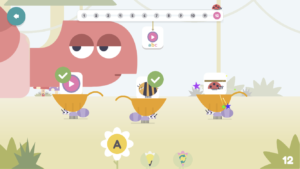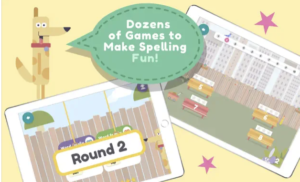Both Hooked on Phonics and Learn with Homer are very popular literacy or learn-to-read apps.
These apps are especially popular among beginner readers, and they both seem to offer and promise very similar things.
So, if you are torn between one or the other… Well, it’s actually not surprising at all!
This article will go through the 9 KEY differences between Learn with Homer and Hooked on Phonics (app version), which will hopefully help you out figure out which one makes more sense in your case!
You’ll also have the opportunity to look inside them, so you can get a feel for what to expect.
However, in order to have some context and background information, it is important to start with what they have in common first!
By the way, if you want to go even deeper on your research, we also have an in-depth review of Learn with Homer here and a ranking of the best learn-to-read apps in 2024, you may want to check out.
Affiliate disclosure: This post may include affiliate links, meaning I could get a little commission if you buy from them, at no additional cost to you. This helps keep the information on this blog free and available to everyone.
What do Homer and Hooked on Phonics app have in common?
Are you in a rush?
In a nutshell this is what Homer and Hooked on Phonics have in common.
Now, you can move on to the next section and learn about the differences between both apps!
Good quality learn-to-read apps
Designed to take your child to more or less 2nd grade level (in conjunction with other things that you do at the same time)
Phonics-based apps
Fun, engaging and immersive experience
Nice and modern design
Learn through music and play
Follow a logic phonics sequence for the introduction of sounds, letters, etc.
App Trials: Homer (30-day free trial) / Hooked on Phonics (7-day free trial OR “almost free” -$1- first month trial for their subscription bundle)
Good quality learn-to-read apps
First of all, let’s start by saying that they are both good-quality learn-to-read apps that have been designed to take your child from complete beginner to skilled reader.
To be more precise, the idea is to take your child all the way up to more or less 2nd grade level.
Of course -as with any other app!- in order to achieve these results, these apps have to work in conjunction with other things that you do at the same time, like the reading lessons your child may have at school. Or, if you are not sending your child to school yet or you are home-schooling, reading to your child and your own learn-to-read lessons.
Fun and engaging apps with a modern design
Both literacy apps are designed to teach literacy in a fun and engaging way. In fact, the design in both apps feels nice and modern, which is something I really appreciate!
I don’t want to give specific names here, but there are other -very popular apps, by the way, out there- that, in my opinion, have a design that feels tired and outdated.
So, in that regard, well done for both! We can’t really tell you which one has a nicer design. It all comes down to your personal preference, really.
Besides, experience in both Learn with Homer and the Hooked on Phonics apps is very interactive and immersive for children.
Moreover, both apps use lots of play and music for making the learning experience more enjoyable for children.

The phonics approach to teaching reading & logic phonics sequence
Both apps are based on the phonics approach to teaching reading.
In both apps phonics concepts (sounds, letters, blends, etc.) are not introduced randomly.
There’s a real scope, a structure and a logic behind the path that children are set on.


Now that we know what they have in common, let’s go with the differences!
There are quite a few, and some of them are pretty significant…
These are the 9 KEY ones that you need to be aware of before making a decision.
9 KEY differences between Hooked on Phonics and Learn with Homer
Difference #1: The Hooked on Phonics app moves faster than Learn with Homer and ONLY focuses on literacy
On the other hand, Homer also includes activities to develop children’s numeracy, creativity or logical thinking.
That could be a plus for Hooked on Phonics if literacy is truly the only subject that you are really interested in, and don’t need/want any of the rest.
Or a plus for Homer if you are also interested in those other parts, not only literacy.
It seems that Hooked on Phonics NOW also includes Hooked on Maths, at no extra cost with your subscription!
Difference #2: Learn with Homer focuses more on the development of Phonemic Awareness
Or, at least, that was my impression after testing the app!
If you don’t know, Phonemic Awareness is the ability to hear the individual sounds in the language.
This is a key skill for becoming a successful reader in the future. So, even though focusing more on Phonemic Awareness could mean going more slowly in the beginning, this is something that maybe will pay off later on!
I also feel that there is more repetition and opportunities to go over concepts in Homer.
As mentioned before, Hooked on Phonics moves faster.

Difference #3: Different phonics sequence and slightly different phonics approach
Another difference is that even though both apps, as mentioned before, have a scope and an order of introduction for sounds, letters, etc. that has a logic behind it -and both use the phonics approach to teaching reading- the specific order and the way in which all of this is executed is very different!
I’ll try to explain this as simply as possible and without getting too technical!
While both apps teach letter names and letter sounds and have activities to teach your child to blend the sounds, at some point along the way Hooked on Phonics starts to place a lot importance on the role of word families.
If you don’t know what word families are, let me explain it to you real quick!
Word families are made up or words that for instance all finish with “at”, such us “cat”, “pat”, “mat”, “rat”, “fat”, or with “op”, such us “hop”, “top”, “cop”, etc.
In other words, Hooked on Phonics will show your child “at” or “op” as a whole rather than as two separate unit of sound (/a/+/t/, /o/+/p/), and then the blending for instance in the word “cat” will be “c”+ “at” /k/ /at/, instead of /k/ /a/ /t/.
This is an “analytic phonics” strategy, and I understand that the logic behind it is that some people feel that children move faster this way.
Still confused? This short video helps you understand the difference between both ways of blending!
I personally don’t like it as much, not because it is bad per se, but because it can confuse children and lead them into thinking that somehow these two letters belong together, and that’s not the case.
It is not the same as some other letters that do belong together, such us “c+h” for the sound /ch/ or “s+h” for the sound /sh/.
So, in my opinion, it is preferable to spend more time blending each individual sound and getting very good at this, and then you can read any word regardless of the word family it belongs to, and without the risk of causing that sort of confusion I explained before!
This would be the focus on a pure Synthetic Phonics approach: individual sounds, blending, structure. And that is the approach used on the Learn with Homer app
To sum things up when it comes to the phonics approach, we could say that Homer uses the Synthetic Phonics approach to teaching reading while Hooked on Phonics uses a blend of Synthetic Phonics with Analytic Phonics.
Different #4: Hooked on Phonics is also a learn-to-read curriculum
Another key difference between both apps is that Hooked on Phonics also offers a (physical) learn-to-read curriculum that can be used in conjunction with the app.
Homer doesn’t have a literacy curriculum, it is just an app.
By the way, if you are actually already using the Hooked on Phonics curriculum to teach your child to read, you’ll find that the activities on the app are going to be a perfect match to the materials your child is studying on the workbooks and the rest of materials.


If that is your case, I would actually look into getting their subscription option to get a bundle including both this app and their text books, readers and more materials.
At the time I am writing this, the first month is only $1, so that really gives you time to see if this works for you or not.
UPDATE: Remember that, as mentioned before (for the time being), they are also offering Hooked on Maths included with your subscription at no additional cost! Check details on their site here!
Different #5: Hooked on Phonics is aligned with Common Core standards
Hooked on Phonics is aligned with Common Core standards and takes your child all the way up to 2nd grade level
What are Common Core standards?
If you are in the US, you may have heard of these before. They are basically a set of standards describe what students should know and be able to do in each grade (K – 12).
Since 2010, a number of states in the US have adopted the same standards for English and maths.
As a side note, the implementation of these standards does not come without controversy in some cases, as some parents and educators argue against the implementation of these.
I won’t go into this topic in this article as it goes well beyond topic and I could make an entire blog post about this.
My point here though is this: Especially if you are home-schooling, you may appreciate that the app is aligned with Common Core standards. It might give you peace of mind.
Difference #6: More customization options in Homer
Another important difference between the apps is that Homer allows for a higher degree of personalization.
When you are setting up your child or children’s profiles you are not only asked questions around what your child knows about the alphabet and the sounds, you are also asked some questions about your child’s interests.
What is your child into: princesses, robots, cars, sports…?

Based on your answers, the app creates a bespoke profile that really matches what your child likes and enjoys.
This might actually be the reason why my children really enjoyed using the app so much, even though I do not know for sure.
In any case, it is something that I really like.

Difference #7: Number of profiles under the same account
You can create up to 4 different profiles under the same account with Homer, and you can create up to 3 different profiles with Hooked on Phonics.
Difference #8: Spelling
Hooked on Spelling is also included with the Hooked on Phonics app.
As the name indicates, this part was created to specifically work on spelling: learning spelling patterns, rhyming words, learn to spell words with suffixes, etc.

Learn with Homer, on the other hand, doesn’t have a section that has been specially targeted for learning to spell.
However, that doesn’t mean it doesn’t target spelling. Some of the learn-to-read activities plus the approach in Homer will definitely also help develop your child’s spelling skills.
Difference#9: Price and Free Trials
Prices (and free trials) go like this:
Homer offers a generous 30-day free trial. That actually gives you plenty of time to check if the app is actually the right choice for your child.
After that, the app is $12.99 a month.
However, if you think you may actually use the app for an entire year, you can save quite a lot.
Their yearly subscription option is $79.99 for the entire year, that is only $6.66 / month.
Hooked on Phonics offers a 7-day free trial.
After that, it is $8.99 a month or you can get a lifetime subscription for $49.99.
If you are interested in their physical learn-to-read curriculum as well, what is really good value is getting the bundle that includes not only unlimited access to the app, but also their learn-to-read curriculum materials sent home on a monthly basis.
You can get started for only $1 the first month, and after that it is 12.99/ month until you decide to cancel, and there are no lock-in contracts. More details about this offer here!
See inside the apps!
If you want to get a glimpse and a feeling for what to expect, watch the last part of this video! Don’t worry, already set up to start on the right minute for you, as this is a long video!
Because… As they say, images speak a thousand words!
Conclusion: Learn with Homer vs Hooked on Phonics
I hope that this article helps you understand the similarities and the differences between both apps, and figure out which one makes more sense in your case.
Remember – KEY takeaways:
- Both use phonics and have a nice and modern design
- The Hooked on Phonics app is aligned with the Hooked on Phonics literacy curriculum and follows Common Core Standards
- Homer focuses a lot on the development of Phonemic Awareness
- Homer uses the Synthetic Phonics approach to teaching reading while Hooked on Phonics is more a combination of Synthetic Phonics + Analytic Phonics
- Homer allows for a higher degree of personalization/customization in line with your child’s preferences
- Homer also works on other skills, including maths, creativity, social skills, and critical thinking
- Hooked on Spelling is also included in the pack (UPDATE: now they also offer Hooked on Maths!)
- Homer offers a 30-day free trial while Hooked on Phonics offers a 7-day free trial OR an “almost free” $1/first month for their subscription bundle (you get their Curriculum materials + unlimited access to the app – cancel anytime)
GO TO Homer – 30-Day FREE trial!
Go to HOOKED ON PHONICS $1 offer!

Hey there! I’m Laura – an author, YouTuber, blogger, and the creator of the “Learning Reading Hub” platform. I created this space to dive into the world of reading instruction and to shout from the rooftops about how vital it is to use the right methods for teaching reading. I’ve got a TEYL certification (Teaching English to Young Learners), plus a Journalism degree from the University of Navarra in Spain, along with a Master’s Degree in Communication.
I’ve always loved digging into research, jotting down my thoughts, connecting with people, and sharing what makes me tick. With a background in marketing, digital projects, and the education scene (especially language learning), I’m all about wearing different hats.
When my first kid needed to learn how to read, it opened my eyes to the challenges and complexities involved. This journey took me through a rollercoaster of self-teaching, eye-opening discoveries, and yeah, some letdowns too. There’s so much conflicting info out there, along with methods that just don’t cut it. And let’s face it, these issues are way too common.
Now, I’m all about channeling that passion (without sounding like a know-it-all!) and sharing my journey. My mission? Making it easier for those who are on the same path I once was.
My heart’s with my family and the amazing Learning Reading Hub project. I live with my husband and two little ones, raising them in a bi-lingual environment (English and Spanish).




2 replies on “Comparing the Homer app VS Hooked on Phonics – KEY Differences and Similarities Revealed!”
I love how the Homer app compares to Hooked on Phonics! The app is so user-friendly and the lessons are so engaging. I love that the app includes games and activities to keep the lessons fun and interesting. I also
It’s great to hear your experience. Glad that you are enjoying it!